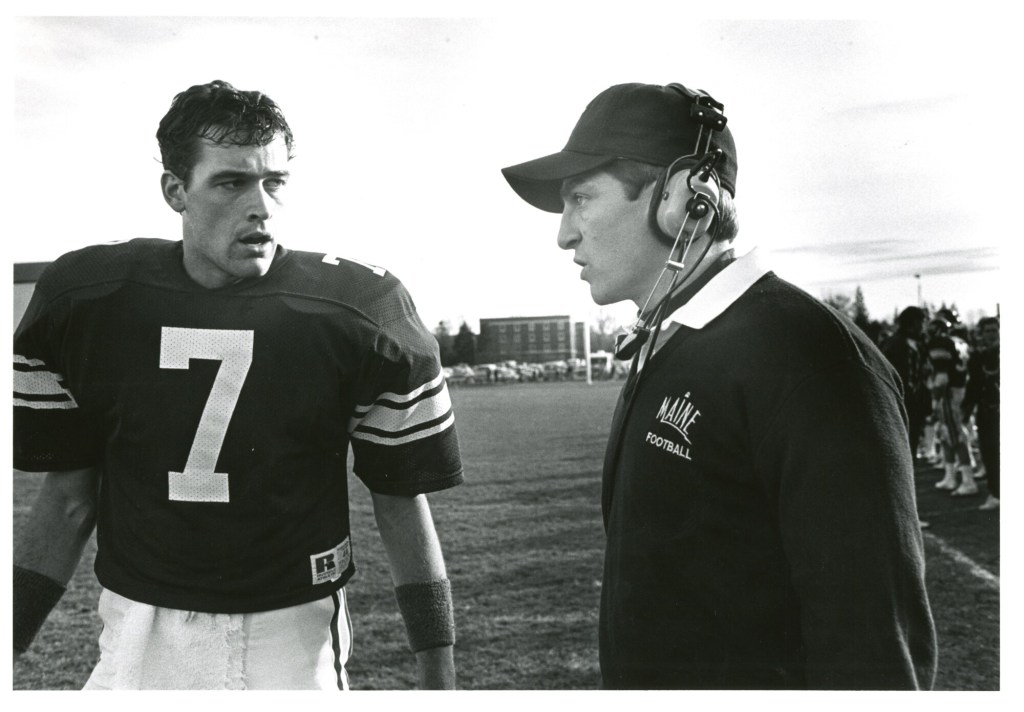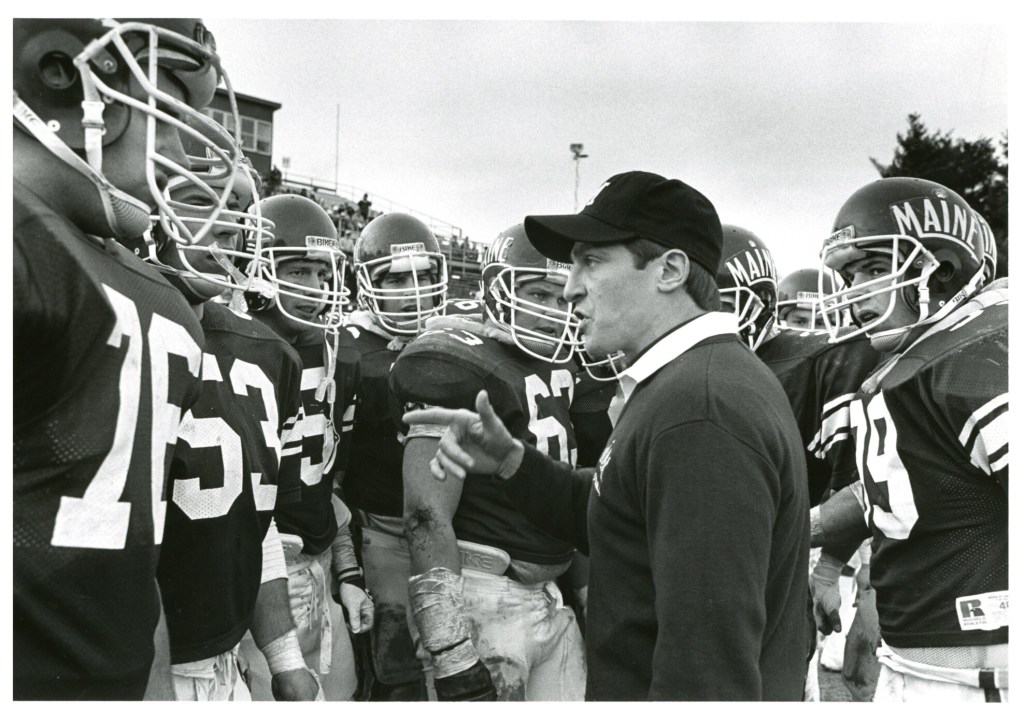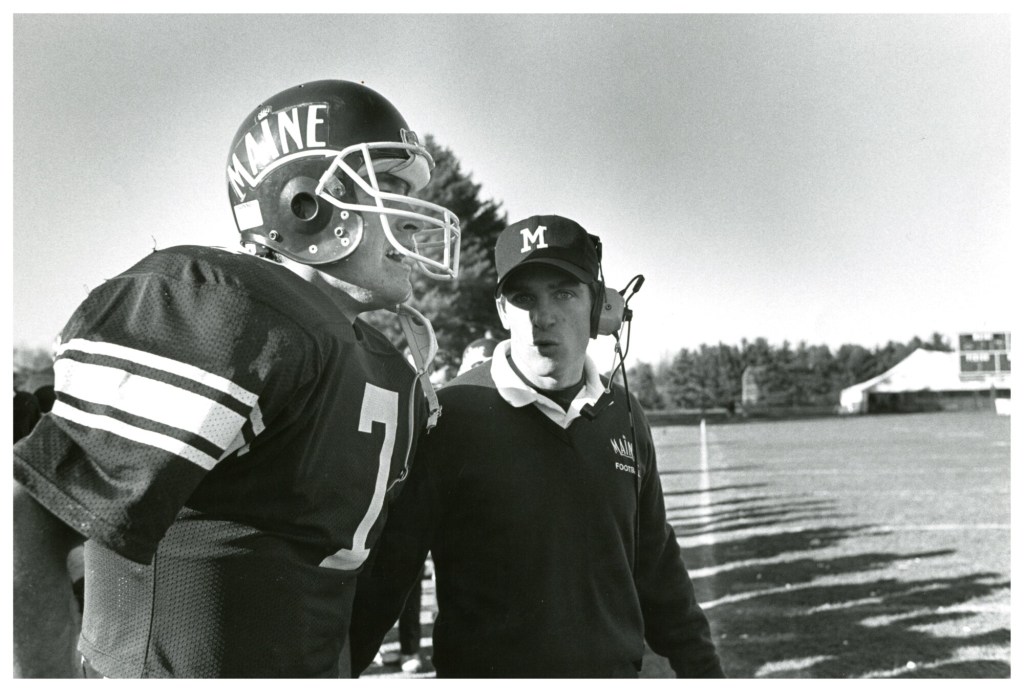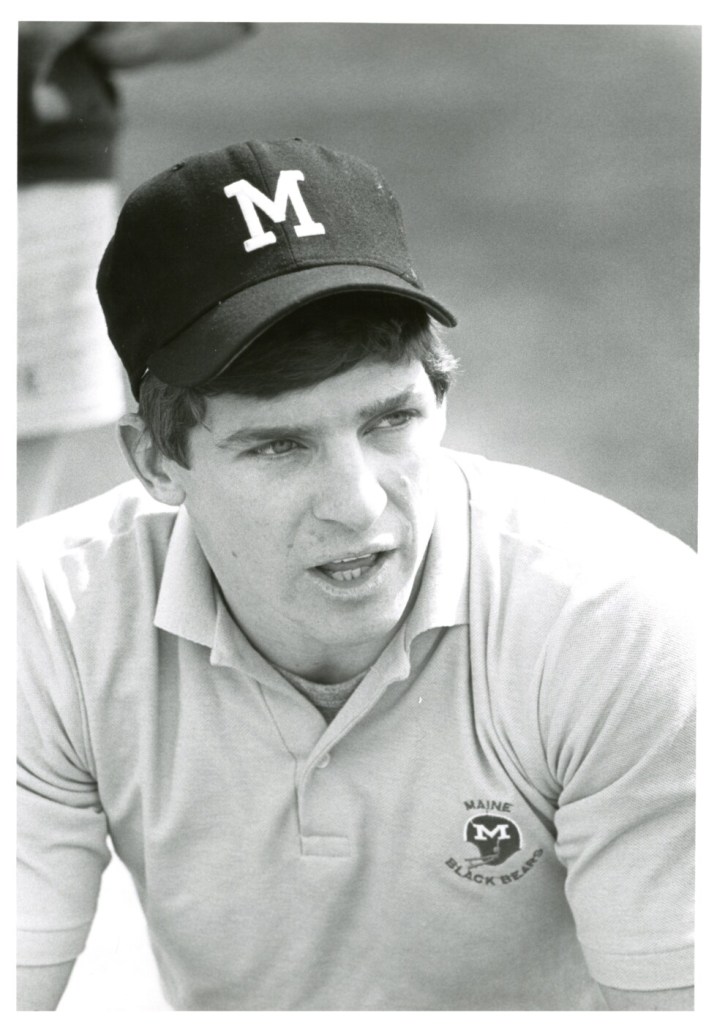Bobby Wilder remembers his first encounter with Buddy Teevens like it was yesterday, rather than 38 years ago.
“I come into the first team meeting, and he just captures the room,” the Madison native and former University of Maine quarterback said of the winter day in 1985 when he met the Black Bears’ new head coach. “You’re talking 110 guys, first team meeting, ready to run through the wall for this guy. He had us excited, fired up.”
Eugene “Buddy” Teevens is one of the more significant names in recent New England college football history. Over the course of two stints as Dartmouth College coach, he has made an impact not just in the New Hampshire woods, but throughout college football. Five Ivy League titles. Female assistant coaches. The abolition of live tackling at practice, replaced by robotic tackling dummies, bold moves that received nationwide attention as concussions and CTE dominated headlines.

Teevens is currently recovering from a March bicycle crash in Florida that resulted in the loss of his right leg. The chances of his returning to the Big Green sideline are unknown, but Teevens has conquered long odds before — such as when he arrived at Maine in ’85 as a 28-year-old rookie head coach, not that much older than some of his players. And it was at Maine where Teevens not just launched his coaching career, but revived a program whose glory days had been in the past.
The picture wasn’t pretty: Three winning seasons since 1966; fewer scholarships than their Yankee Conference brethren (according to contemporary accounts, Maine had 54; the NCAA Division I-AA/FCS max was 70 at the time); and home games at decrepit Alumni Field, whose creaky wooden bleachers felt ready to give way at any minute.
Teevens also ditched Maine’s ground-based wing-T offense for a modern pro-style attack, despite the lack of larger personnel up front required to pull it off.
For many players, Maine was their last chance at a Division I career. Duane Brooks, a defensive lineman at Maine from 1983-86, had aspired to play at Boston University, but was told by a Terriers assistant he wasn’t good enough. His name? Buddy Teevens.
“We were misfits, we were just a bunch of people from different places, who were probably angry that we couldn’t play at BU or BC, so we all went to Maine together,” said Brooks, who despite being a self-described “pain in the ass” eventually became a favorite of Teevens and has been his defensive line coach at Dartmouth since 2014.
From that very first meeting, though, the “misfits” bought into Teevens’s big ambitions, Wilder said in a recent phone interview from Virginia.
“His energy, his organization, the details he talked about, how we were going to play, how we were going to practice, what our offseason workout and winter conditioning were going to be like — this guy had a 12-month plan that he easily put in front of us in 15 minutes, and from that point on, I was in,” Wilder said.
And the new coach put his money where his mouth was, according to Brooks. If he told the players to run two miles, he’d run with them. When the players hit the weights, Teevens was right there lifting with them.

University of Maine football coach Buddy Teevens, right, talks to his team during a 1985 game in Orono. (Photo courtesy University of Maine Athletics)
The results paid off quickly. During Teevens’s two seasons in Orono, Maine went 6-5 and 7-4, the Black Bears’ first consecutive winning seasons since 1963-65. Freed from the wing-T and allowed to throw the football at will, Wilder set seven school passing records under his new coach.
The atmosphere changed elsewhere, as well. The players bulked up, and not just from the food that Teevens’s wife, Kirsten, would bring for them; a new weight room opened in the ROTC building. Teevens hit the banquet circuit and “got some donors involved that stayed with us for a long time,” said Wilder, who was a Black Bear assistant from 1990-2006. “Buddy was the first one that really got that going. I give him a lot of credit for turning that program around.”
In ’85, Maine saved the best for last, when it ended the season with upsets of NCAA I-AA Tournament hopefuls New Hampshire (45-40) and Delaware (10-7). Against the Blue Hens, Bears tailback Lance Theobald scored a touchdown with 56 seconds remaining in the cold and mud of Delaware Stadium to give Maine its first win over Delaware in 11 tries and knock out the Hens from NCAA consideration.
Wilder — who threw for 174 yards, 147 to star wideout Sergio Hebra — said the Black Bears received a dose of motivation before the game when they were greeted in the locker room by a sign that wished Delaware good luck in the playoffs.
“(Teevens) played it up all week that if Delaware beat us, they’d be in the playoffs,” he said. “I never asked him that question, but I think he might have had something to do with that sign. He basically turned that into our playoff game. We hadn’t even heard the word ‘playoff’ being used at the University of Maine. You just gravitated toward that type of mentality.”
After 1986, Teevens returned to his alma mater to resuscitate another struggling program while Maine won a pair of Yankee Conference titles under successors Tim Murphy and Tom Lichtenberg. Wilder played one more season at Maine, returned as an assistant in ’90 and from 2007-19 was the head coach at Old Dominion, where in less than a decade he turned the Monarchs from shiny-new program into a bowl winner.

Eugene “Buddy” Teevens as a rookie head coach with the University of Maine in 1985. (Photo courtesy University of Maine Athletics)
Not long after that Bahamas Bowl victory, Wilder sat down with Teevens at a coaches’ convention in January 2017 and they chatted for an hour, away from everyone else. Wilder thanked him for his guidance in instilling young people with a positive attitude, to believe in success. And to emphasize the word “winning.”
“Buddy had his moments when he’d dig in our ass when we needed it,” Wilder said, “but it was always something to do with winning, being successful, and football is a microcosm of life and this going to lead to you being a good husband, a good father, a good leader in your community. He always brought it all together in a way we could understand.”
Brooks, the defensive lineman, graduated from Maine in 1987. After Teevens’s accident, Brooks said he got calls from former teammates he hadn’t heard from since the ’80s.
While Teevens has a long list of accomplishments at Dartmouth, that first Maine team from ’85 has never been far from the coach’s heart, Brooks said.
“He doesn’t really talk about it, because he gets misty when he talks about it,” Brooks said. “He always says, ‘I should try to call up more people,’ and I go, ‘Coach, we get it. We know you understand and you liked us, because you took us to another level.’”
Comments are not available on this story.
Send questions/comments to the editors.






